What is Candidate Engagement and Why Does It Matter?
Updated : 5 months ago

Today’s job market is very competitive and if you are just posting job openings, it isn’t enough. Instead, attracting and hiring the best talent requires a deeper, more relational approach. That’s where candidate engagement comes in.
It's the art and science of maintaining an active, meaningful two-way connection with candidates. And it is done throughout the hiring process. But what does that really involve—and why is it so critical?
What Is Candidate Engagement?
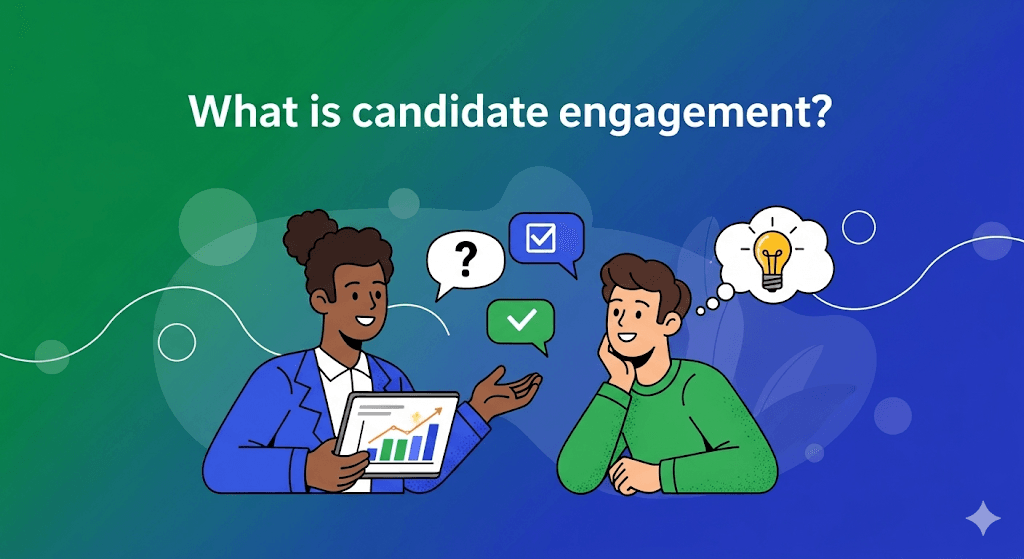 Candidate engagement refers to the ongoing communication and relationship-building between -
Candidate engagement refers to the ongoing communication and relationship-building between -
- recruiters (or hiring organizations) and
- job candidates
It has to be done from the first touchpoint through onboarding. It's about keeping candidates interested, informed, and connected at each recruitment stage.
It even goes beyond standard candidate experience—which is how candidates feel about their journey—into proactive effort and intentional connection.
Engagement is about shaping that experience actively, instead of letting it unfold passively.
What’s the Difference Between Candidate Engagement & Candidate Experience?
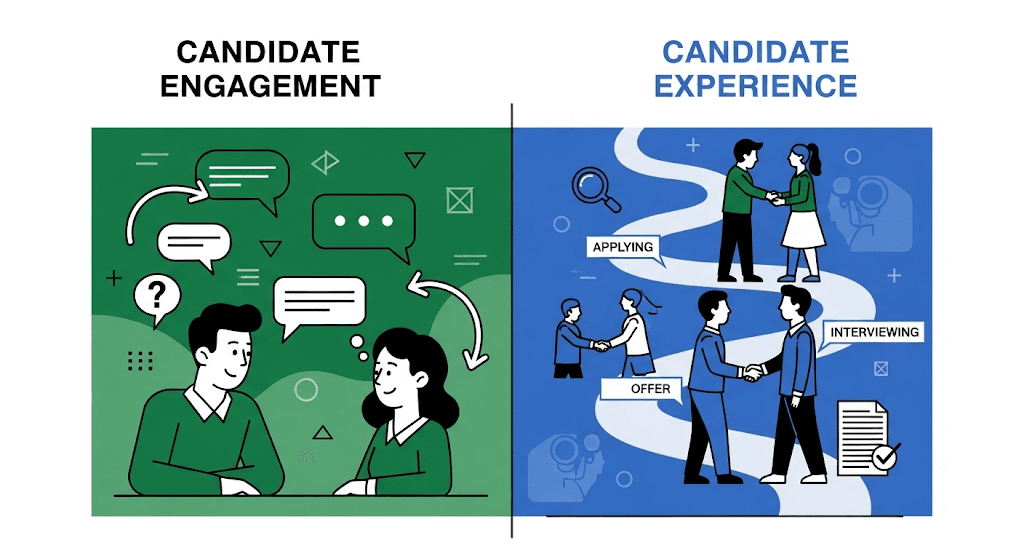 Candidate experience is what happens to the applicant. It's how they feel about the hiring process as a whole. It's the overall impression they get from start to finish.
Candidate experience is what happens to the applicant. It's how they feel about the hiring process as a whole. It's the overall impression they get from start to finish.
A good experience feels smooth, professional, and easy. A bad one feels disorganized or frustrating.
Candidate engagement is what you, as an employer, do to make that experience positive.
It's the active effort that you make to connect with and influence the candidate. It includes things like -
- sending professional and personalized emails,
- providing on time updates, and
- giving feedback
Here's an example for better insights:
A well-designed job application website gives a candidate a great experience. The reason is it's easy to use.
However, when you send a follow-up email that says "Thanks for applying, we'll be in touch soon" is a form of engagement.
It's a direct action that connects you with the person.
In short -
- experience is the outcome, and
- engagement is the action you take to get a positive outcome
Both are important when they work together to make sure candidates feel valued and informed. It helps you attract and hire the best people.
Why Candidate Engagement Matters?
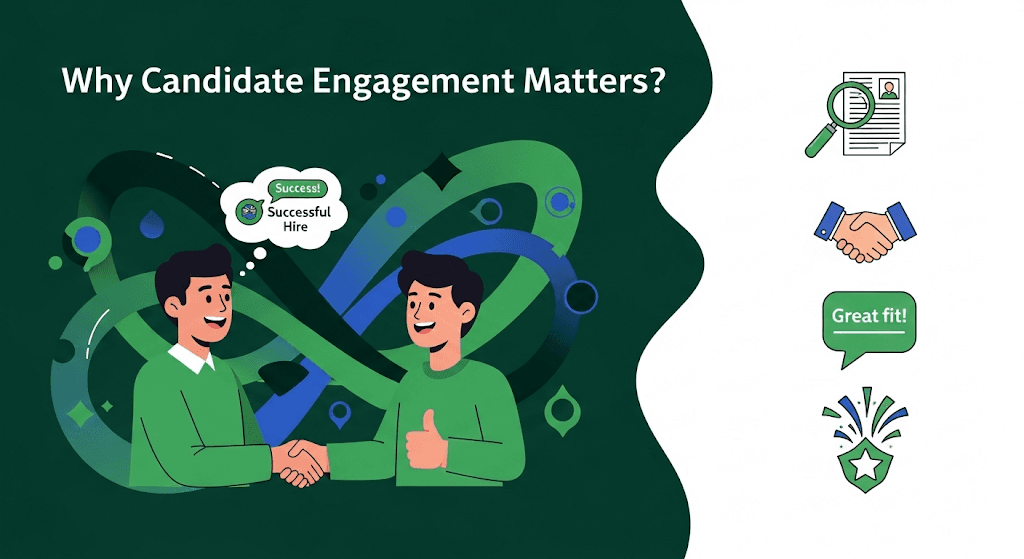 Here’s why effective candidate engagement is essential:
Here’s why effective candidate engagement is essential:
Attracts Top Talent
When there are strong engagement strategies, these help companies make candidates feel valued. It increases interest in opportunities. It is done through personalized messaging and timely communication.
Reduces Dropout Rates
When candidates feel informed and engaged, they are less likely to abandon the application process mid-way. It reduces the dropout rates and improves hiring efficiency.
Improves Hiring Outcomes
Engaged candidates are more likely to stay invested in the process. Studies show those who have a positive candidate experience are 38% more likely to accept offers.
Enhances Employer Brand
Engagement carries a reputation for transparency and respect. Candidates—even if not selected—who experience good engagement may -
- recommend the company
- reapply, or
- speak favorably about the brand
Facilitates Better Vetting
Ongoing two-way communication allows both sides to gather and share insights. It makes the evaluation process richer and more informed.
What Are The Best Practices for Building Candidate Engagement?
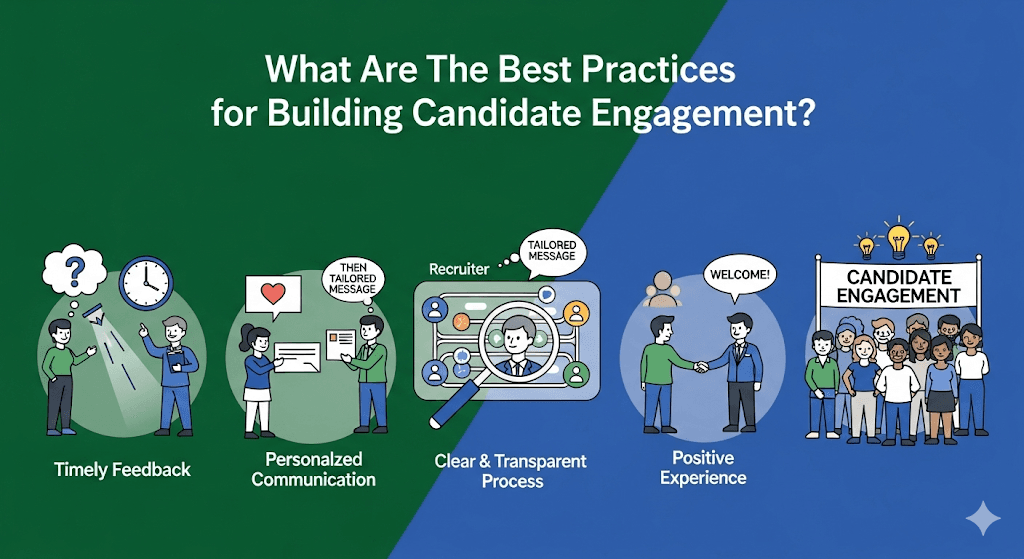 Here are strategies you can create for your hiring process:
Here are strategies you can create for your hiring process:
Timely and Personalized Communication
You need to address applications quickly. For that, you can use -
- candidates' names
- reference of their backgrounds, and
- highlight aspects relevant to them
Multi-Channel Touchpoints
You can combine -
- emails
- texts
- calls
- chatbots, or
- event interactions
It keeps engagement dynamic and suited to candidate preferences.
Leverage AI & Automation Intelligently
AI tools such as chatbots can -
- answer FAQs
- schedule interviews, and
- share real-time updates
It streamline candidate engagement at scale.
Proactive Feedback & Transparency
Even simple updates like acknowledging application receipt or sharing next steps go a long way in creating trust and clarity.
Engagement Throughout the Funnel
Don’t go silent between steps. Make sure the candidates remain connected from initial touchpoints through final decisions.
How Technology Helps Engage Candidates?
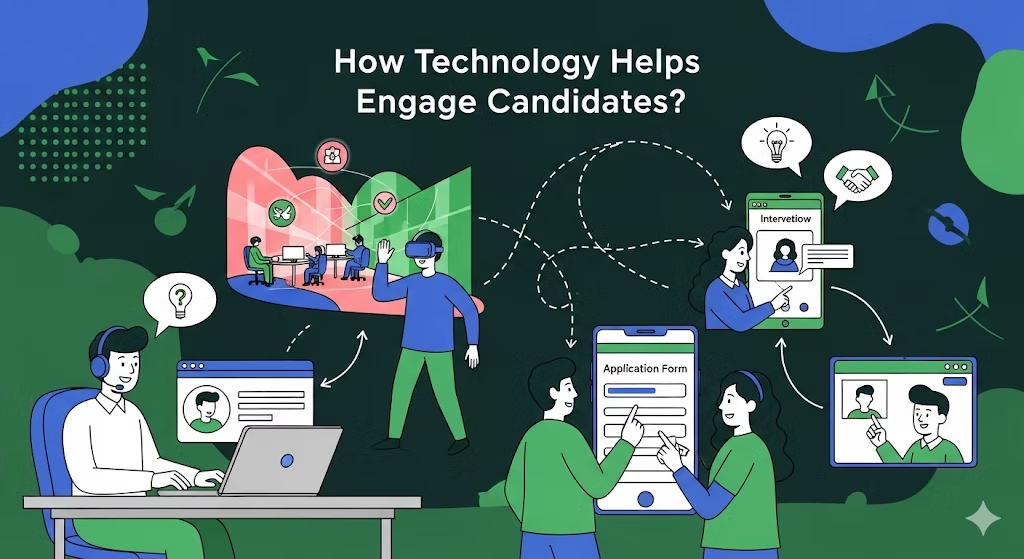 Technology plays an important role in keeping candidates informed and interested. It automates simple, repetitive tasks that allow recruiters to focus on building relationships.
Technology plays an important role in keeping candidates informed and interested. It automates simple, repetitive tasks that allow recruiters to focus on building relationships.
Quick Answers With AI
Tools like chatbots and AI assistants can quickly answer common questions and schedule interviews. It makes sure every candidate gets a fast response. There is no one left waiting.
Staying Organized
Applicant Tracking Systems (ATS) and other recruiting software help recruiters manage a lot of applicants.
These systems keep communication and notes organized. It is needed so that no candidate gets forgotten.
Showcasing Company Culture
Social media platforms allow companies to show what it's really like to work for them. Those include -
- Instagram, and
- TikTok
When you share behind-the-scenes videos and employee stories, it helps build a connection with potential candidates. It happens long before they even apply.
How Companies Measure Candidate Engagement?
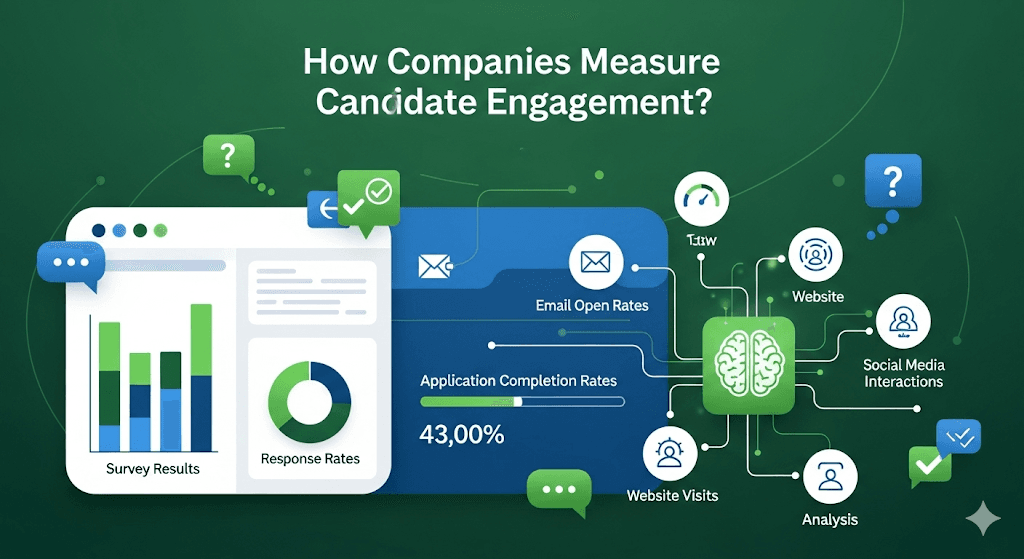 Companies don't just make a guess if their engagement efforts are working. They use specific measurements to find out.
Companies don't just make a guess if their engagement efforts are working. They use specific measurements to find out.
Key Numbers:
They track things like -
- how many candidates finish their applications
- how many open the emails they send, and
- how many accept job offers
A high offer acceptance rate shows that candidates are engaged.
Candidate Feedback:
Companies also use surveys to get direct feedback.
For example, they might ask, "How clear was the communication about the next steps?"
It helps them see if they're doing a good job to keep candidates informed
Online Reputation:
A company's reputation can be known from sites like Glassdoor. And, also from the number of referrals they get from current employees.
These are also great indicators of strong engagement.
When candidates have a good experience, they are more likely to recommend the company to others.
Some Insights from the IRJMETS 2022 Paper
The study titled “A Study on Candidate Engagement in …” (June 2022, IRJMETS) focuses on candidate engagement by surveying job seekers’ -
- awareness
- satisfaction, and
- communication experiences during recruitment
Here's what it reveals:
Recruitment Awareness & Process
The majority of respondents were aware of the recruitment process steps—
- job analysis
- sourcing
- screening
- selection and
- Onboarding
It shows their familiarity with hiring workflows.
Information Access
About 60.3% of candidates were able to reach out to a concerned person to clarify their questions. Whereas roughly 31% could not. It highlights shortcomings in accessibility and communication.
Satisfaction Levels
36.2% of respondents reported being highly satisfied with their recruitment experience. About 50% were satisfied Only 5.6% were neutral and 5.2% reported dissatisfaction
Communication Impressions
The recruitment communication was perceived as “exciting & fast and smooth” by many. However, 10.3% found it boring, while 2.3% felt it was unnecessarily long. It shows there is still a need for improvement.
Conclusion from the study
Candidate engagement largely yields positive responses. However, enhancing communication quality and frequency can address gaps and elevate the overall experience.
What Will Be The Future Of Candidate Engagement?
Recruitment is changing. The reason is new technology and a new generation of workers.
Technology will help, not replace, recruiters.
Recruiters won't be replaced by AI-powered hiring platforms. Instead, AI will help them connect with many candidates. That too in a more personal way.
For example, it might predict which candidates are most likely to accept a job offer. It can help recruiters focus on their efforts.
Gen Z is changing expectations.
The newest generation entering the workforce is known as Gen Z. They want fast, honest, and inclusive communication.
They care about a company's values, like -
- sustainability and
- diversity
If they feel a company isn't genuine, they will quickly lose interest. They prefer to switch.
Job descriptions Will Change.
Now, the companies will need to do more than just list job duties. They will have to share their -
- story,
- values, and
- culture
It can be done through videos and social media content. It helps candidates feel a genuine emotional connection to the company and builds relationships over time.
Finally…
Candidate engagement is about more than just a good hiring process. It's about meeting basic human needs.
When a company engages with a candidate, it addresses their psychological needs for -
- recognition
- clarity, and
- fairness
It builds trust. A company should communicate clearly and on time. It shows respect for the candidate's time and effort.
The transparency can reduce the stress that comes from waiting. When people don’t know anything, they often protect themselves from disappointment.
Frequently Asked Questions
1. What are the three pillars of engagement?
The three pillars of engagement are -
- communication
- collaboration, and
- commitment
These are fundamental to building a strong relationship with individuals.
2. What makes a good engagement strategy?
A good engagement strategy is clear about -
- what can and
- cannot be influenced
Its purpose should be plainly stated at the beginning. It can ensure everyone involved knows what difference the engagement can actually make.
3. How do you engage candidates?
You need to be engaged yourself to engage candidates. It means:
- Respect their time
- Make the application process easy for them
- Have some strong interview skills
- Maintain a good reputation for your company
4. What is Candidate Engagement?
Candidate engagement is all about building a positive relationship with job seekers. It involves consistent communication and interaction. And, you need to know that it’s important during the recruitment process to make candidates feel -
- valued
- heard, and
- informed

